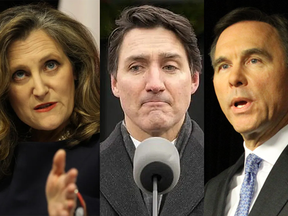Quebec will do whatever it takes to catch up to its neighbour to the West
Article content
Ontarians are wealthier than Quebeckers, but Francois Legault is on a mission to close the gap.
“Five years ago, our government embarked on a major endeavour to close the wealth gap that lies between us and our main trading partners,” the Quebec premier wrote in the province’s fiscal update in November. “Québec has some unique advantages. It is up to us to leverage those advantages to accelerate the process of closing the gap for the benefit of all Quebecers.”
Advertisement 2
Article content
Article content
That means eliminating a GDP per capita differential that is narrowing, but currently hovers at about 13.5 per cent. Here’s what you need to know about the gap and Quebec’s multi-pronged effort to catch up with its wealthier neighbours.
How wide is the gap?
Quebec’s GDP per capita, or standard of living, has been lower than its main trading partners, Ontario and the United States, for the past forty or so years. GDP per capita currently hovers at around $49,000 in Quebec and $54,000 in Ontario, but varies from quarter to quarter.
Legault says he’s managed to shrink the gap from 16.1 per cent in 2018 to 13.5 per cent in 2022, but there is plenty of work to be done to reach his upcoming targets of a 10 per cent reduction by 2026 and total elimination by 2036.

Some, however, question whether the gains so far are even sustainable. The recent narrowing may have more to do with an economic slowdown in Ontario than with strides made in Quebec, said Jonathan Deslauriers, executive director at the Centre for Productivity and Prosperity at the HEC Montreal business school. Ontario’s real GDP is projected to grow 0.2 per cent in 2023, down from 3.7 per cent in 2022.
Article content
Advertisement 3
Article content
Why is there a gap?
The history of the wealth gap can be traced back to differences in Quebec and Ontario’s industrial histories, said Steven High, professor of history at Concordia University.
In the mid-twentieth century, Quebec’s economy was mostly centred around clothing and textiles, he said. Ontario, however, was more focused on the automotive sector and steel. When industries like clothing manufacturing began to move offshore, into countries where labour was cheaper, Montreal was hit earlier, and harder, than Toronto.
The wealth gap also stems from historical discrimination against French-speakers, added High. Given that the “language of industry” was English, Francophones tended to be relegated to lower-wage jobs.
Though the discrimination was not written into law, it was still “baked into” the Canadian system, High said. French-speaking Quebeckers began to prosper following the Quiet Revolution of the 1960s, a period of rapid modernization, and the passage of Bill 101 which was aimed at upholding the rights of francophone minorities.
According to the Quebec fiscal update, the gap persists today because over half of Quebeckers work in lower-wage industries; small- and medium-sized businesses are the “backbone” of Quebec’s economy, but generate less money than large businesses; the work week in Quebec is shorter than in Ontario (31.8 hours, compared to 32.8 hours); business investment and entrepreneurship is comparatively weak; and businesses pay comparatively higher taxes.
Advertisement 4
Article content

Quebec also has a productivity problem, said Deslauriers, of the HEC. But that’s not unique to Quebec — the issue is Canada-wide.
Canada’s output per hour worked is lower than that of other G7 countries. “Canada’s productivity gap is worrisome and has a direct impact on our standard of living,” said Renaud Brossard, senior director of communications at the Montreal Economic Institute, in a press release.
On top of this, private investment in Canadian companies is weak. A study by HEC researchers shows that there is not enough competition to stimulate the competitiveness of companies in the country.
“Given the geographic dispersion and segmentation of its economy, Canadian firms have historically developed in small domestic markets, limited to provincial scale and protected by administrations that deemed foreign competition a threat to a small economy like ours,” said director Robert Gagné in a press release.
Greater competition would enable companies to “develop the proper reflexes in terms of investment and innovation” which would, in turn, “boost their productivity,” said Gagné.
Advertisement 5
Article content
Why does it matter?
Quebec’s choice of Ontario as a comparator, rather than another high-income province or the country, is not just a matter of provincial rivalry, said Deslauriers. Ontario has historically been a good comparator for Quebec because the two provinces have similar industrial structures.
The Quebec government did note, however, that the wealth gap is not the sole measure for prosperity in the province; other indicators include the World Happiness Index, Human Development Index and Quebec Progress Indicators.
This goal is not an end in itself — it aims to give Québec the means to achieve its ambitions
Francois Legault
The wealth gap is not an all-encompassing measure. It does have a major impact on the daily lives of Quebeckers, though. For one, they have less money in their pockets than their neighbours to the West, and perhaps fewer savings to fall back on when times get tough.
“This goal is not an end in itself — it aims to give Québec the means to achieve its ambitions,” Legault in the November report. “Accordingly, Québec will be better equipped to face the many collective challenges ahead. Such a success will also reduce Québec’s dependence on federal transfers and financial markets, while enabling it to maintain, if not improve, the competitiveness of its tax system.”
Advertisement 6
Article content
How is it going?
The gap has been narrowing since the 1990s, and began to narrow at an even greater rate beginning in 2015, said Deslauriers. If the trend continues at this rate, Quebec and Ontario will be on par by 2040, he added.
Since its election in 2018, the Legault government has taken steps to bridge the divide by increasing the labour force, encouraging business competition and promoting the development of large enterprises by creating a more competitive business and regulatory environment, among other efforts.

The government has seen good progress, Finance Minister Eric Girard said, but that there is still some ways to go. “It is important to continue and intensify our efforts in this regard,” he added.
Quebec has the tools, he said. For one, the province is the largest producer of hydroelectricity in North America. The province’s real estate market is also extremely accessible; in 2022, the average price of a home was $483,000, compared to $931,000 in Ontario. Plus, household debt levels are low and childcare is relatively affordable.
What’s next?
Quebec has brought in financial and economic experts to help chart the next steps in closing the gap.
Advertisement 7
Article content
The experts — including representatives of Scotiabank, Desjardins, The University of Quebec in Montreal and Yale School of Management — recommended that Legault take a number of steps, many of which the government was already doing: investing more in education and training, fostering a competitive environment, reviewing the taxation system on individuals and businesses and introducing incentives to encourage business investment, among others.
Recommended from Editorial
-

Income gap between new immigrants, broader public narrows
-

Canada’s economy grows more than expected
-

What latest GDP numbers mean to Bank of Canada
The government seems ready and willing to follow the recommendations.
“It is essential for a developed and modern society like ours to reflect on past actions and to make the most of our economic expertise,” Girard said. “The proposals received will deepen our reflection on wealth creation in Québec.”
• Email: mcoulton@postmedia.com
Bookmark our website and support our journalism: Don’t miss the business news you need to know — add financialpost.com to your bookmarks and sign up for our newsletters here.
Article content
Why Quebec is trying to close the decades-long wealth gap with Ontario
2024-02-01 11:00:21








